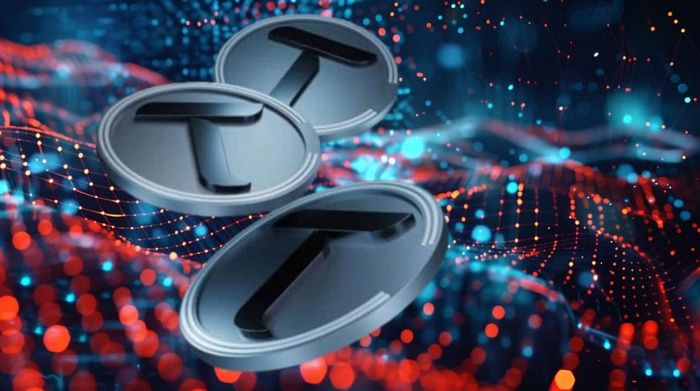-
 Bitcoin
Bitcoin $82,375.1836
2.45% -
 Ethereum
Ethereum $1,912.3988
0.39% -
 Tether USDt
Tether USDt $0.9995
-0.03% -
 XRP
XRP $2.1860
4.40% -
 BNB
BNB $555.2814
0.11% -
 Solana
Solana $123.2630
0.23% -
 USDC
USDC $0.9998
-0.01% -
 Cardano
Cardano $0.7328
1.71% -
 Dogecoin
Dogecoin $0.1654
4.18% -
 TRON
TRON $0.2224
-4.06% -
 Pi
Pi $1.5875
14.15% -
 UNUS SED LEO
UNUS SED LEO $9.8974
1.71% -
 Hedera
Hedera $0.2014
3.11% -
 Chainlink
Chainlink $13.0642
2.84% -
 Stellar
Stellar $0.2545
2.19% -
 Avalanche
Avalanche $17.5175
3.18% -
 Shiba Inu
Shiba Inu $0.0...01212
4.15% -
 Sui
Sui $2.2455
3.41% -
 Litecoin
Litecoin $89.9128
2.23% -
 Bitcoin Cash
Bitcoin Cash $335.6696
-0.36% -
 Toncoin
Toncoin $2.6682
2.70% -
 Polkadot
Polkadot $3.9916
0.90% -
 MANTRA
MANTRA $6.2652
-1.16% -
 Ethena USDe
Ethena USDe $0.9993
-0.01% -
 Dai
Dai $1.0000
0.01% -
 Bitget Token
Bitget Token $4.1554
0.62% -
 Hyperliquid
Hyperliquid $13.7998
-3.69% -
 Monero
Monero $210.2160
3.74% -
 Uniswap
Uniswap $5.9906
1.67% -
 Aptos
Aptos $5.1679
-4.76%
What is ENS coin
ENS coin, the native cryptocurrency of the Ethereum Name Service, is essential for governance, supporting network security, and facilitating the creation and renewal of human-readable names for Ethereum resources.
Nov 15, 2024 at 07:36 pm

What is ENS Coin: A Comprehensive Guide to the Ethereum Name Service
Introduction
The Ethereum Name Service (ENS) is a distributed, open-source naming system built on the Ethereum blockchain. It allows users to create and manage human-readable names for Ethereum addresses, websites, and other resources. ENS eliminates the need to remember long and complex crypto addresses, replacing them with user-friendly names that are easier to recall and share.
The Role of ENS Coin
ENS coin, often referred to as ENS, is the native cryptocurrency of the ENS ecosystem. It serves several vital roles within the network:
- Governance: Holders of ENS coin participate in the governance of the ENS protocol through a Decentralized Autonomous Organization (DAO). They can vote on changes to the protocol and make decisions about its future development.
- Fees: ENS coin is used to pay for the creation and renewal of ENS names. These fees help secure the network and incentivize node operators to maintain its stability.
How to Use ENS Coin
Step 1: Acquire ENS Coin
There are several methods to acquire ENS coin:
- Cryptocurrency exchanges: Purchase ENS coin on exchanges such as Binance, Coinbase, or Uniswap.
- ENS Marketplace: Buy ENS names directly from the ENS Marketplace using Ethereum or other supported cryptocurrencies.
Step 2: Set Up an Ethereum Wallet
To manage your ENS coins and interact with the ENS network, you'll need an Ethereum wallet. Trust Wallet, MetaMask, or Ledger are popular options that support ENS functionality.
Step 3: Register an ENS Name
Once your wallet is set up, you can register an ENS name on the ENS website. Choose a name that is relevant to your project or personal brand, and check its availability. The registration process requires a one-time payment of ENS coin for the name's duration (e.g., one year or multiple years).
Step 4: Configure Your ENS Name
After registering an ENS name, you can configure it to point to different Ethereum addresses, websites, IPFS content, or social media profiles. This allows you to create a centralized point of reference for your various online identities.
Step 5: Manage Your ENS Name
Once your ENS name is set up, you can manage it through your wallet or the ENS Manager website. You can renew your name before its expiration to maintain its validity. Additionally, you can delegate your name to a trusted party or use a subdomain structure to organize multiple names under a single root.
The Future of ENS Coin
As the web3 ecosystem continues to grow, ENS is positioned to play a crucial role in providing a user-friendly and secure naming service for the decentralized internet. The utility of ENS coin is likely to expand as the network evolves and new applications are developed. Here are some potential future developments:
- Integration with DeFi protocols: ENS can streamline the user experience for DeFi transactions by allowing users to interact with protocols using simple and memorable names instead of complex contract addresses.
- Metaverse naming: As the metaverse becomes more prominent, ENS can provide a foundation for naming virtual identities, assets, and experiences.
- Cross-chain interoperability: ENS is exploring ways to expand its functionality beyond the Ethereum ecosystem, enabling name resolution across multiple blockchains.
Conclusion
ENS coin plays a vital role in securing and governing the Ethereum Name Service. It allows users to create and manage human-readable names for Ethereum resources, simplifying the interaction with the decentralized web. As the ENS ecosystem expands, ENS coin is expected to become even more integral to the infrastructure of web3.
Disclaimer:info@kdj.com
The information provided is not trading advice. kdj.com does not assume any responsibility for any investments made based on the information provided in this article. Cryptocurrencies are highly volatile and it is highly recommended that you invest with caution after thorough research!
If you believe that the content used on this website infringes your copyright, please contact us immediately (info@kdj.com) and we will delete it promptly.
- Bitcoin (BTC) Under Severe Selling Pressure, Having Lost the $85,000 Level Just a Few Days Ago
- 2025-03-12 15:35:50
- The Next Big Cryptocurrency Resurgence: Ethereum (ETH), Ripple (XRP), Dogecoin (DOGE), and Minotaurus (MTAUR)
- 2025-03-12 15:35:50
- U.S. Lawmakers Voted to Cancel an IRS Rule That Required Crypto Companies
- 2025-03-12 15:10:50
- US Senator Cynthia Lummis reintroduces BITCOIN Act to allow the government to potentially hold more than 1 million Bitcoin
- 2025-03-12 15:10:50
- XRP (XRP) Price Prediction: What Happens to the Crypto Asset After the SEC Lawsuit?
- 2025-03-12 15:05:50
- Crypto Market: Bitcoin (BTC) Price Today Surges 4% to Reclaim $82K Level; Market Cap Up 3.33% to $2.67T
- 2025-03-12 15:05:50
Related knowledge

What is Ethereum’s Slashing mechanism and how to punish malicious behavior?
Feb 20,2025 at 03:08am
Key PointsOverview of slashingDifferent types of slashing in EthereumIncentives and consequences of slashingIdentifying and reporting slashed validatorsOngoing discussions and potential improvementsEthereum's Slashing Mechanism: Punishing Malicious BehaviorEthereum's slashing mechanism is an essential tool for ensuring network security and punishing mal...

What is the verifier node of Ethereum and how to become a verifier?
Feb 19,2025 at 06:00pm
The Verifier Node of Ethereum: A Comprehensive GuideKey Points:What is a Verifier Node?How to Become a Verifier NodeResponsibilities and Rewards of a Verifier NodeMinimum Requirements for Becoming a Verifier NodePotential Difficulties in Running a Verifier Node1. What is a Verifier Node?A Verifier Node is an independent entity on the Ethereum network th...

What is Ethereum’s staking, and how to participate and earn money?
Feb 19,2025 at 04:37pm
Key Points:Understanding Ethereum's Staking MechanismSteps to Participate in StakingBenefits and Rewards of StakingSecurity and Risk ConsiderationsTechnical Requirements and Hardware OptionsPotential Challenges and Troubleshooting TipsFAQs on Ethereum StakingWhat is Ethereum's Staking?Proof-of-Stake (PoS) is a consensus mechanism used in blockchain netw...

What is Ethereum’s DAO (Decentralized Autonomous Organization) and how does it work?
Feb 20,2025 at 03:12am
Key PointsDefinition and Structure of a DAOGovernance and Decision-Making in DAOsBenefits and Use Cases of DAOsChallenges and Limitations of DAOsWhat is Ethereum's DAO (Decentralized Autonomous Organization) and How Does It Work?Definition and Structure of a DAOA Decentralized Autonomous Organization (DAO) is an innovative governance and management fram...

What is Ethereum's multi-signature wallet and how to improve security?
Feb 20,2025 at 02:18pm
Key Points:Understanding the Concept of a Multi-Signature WalletBenefits and Drawbacks of Multisig WalletsRequirements for Setting Up a Multisig WalletStep-by-Step Guide to Generating a Multisig WalletImplementing Strategies for Enhanced Security1. Understanding the Concept of a Multi-Signature WalletA multi-signature (multisig) wallet in the Ethereum e...

What is Ethereum's oracle and how to provide data for smart contracts?
Feb 21,2025 at 01:30am
Key Points:Understanding the concept of oracles in EthereumExploring different types of oraclesDetailed guide on how to provide data for smart contractsAddressing potential challenges and considerationsWhat is Ethereum's Oracle?Oracles are crucial components in the Ethereum ecosystem, enabling smart contracts to access real-world data and off-chain even...

What is Ethereum’s Slashing mechanism and how to punish malicious behavior?
Feb 20,2025 at 03:08am
Key PointsOverview of slashingDifferent types of slashing in EthereumIncentives and consequences of slashingIdentifying and reporting slashed validatorsOngoing discussions and potential improvementsEthereum's Slashing Mechanism: Punishing Malicious BehaviorEthereum's slashing mechanism is an essential tool for ensuring network security and punishing mal...

What is the verifier node of Ethereum and how to become a verifier?
Feb 19,2025 at 06:00pm
The Verifier Node of Ethereum: A Comprehensive GuideKey Points:What is a Verifier Node?How to Become a Verifier NodeResponsibilities and Rewards of a Verifier NodeMinimum Requirements for Becoming a Verifier NodePotential Difficulties in Running a Verifier Node1. What is a Verifier Node?A Verifier Node is an independent entity on the Ethereum network th...

What is Ethereum’s staking, and how to participate and earn money?
Feb 19,2025 at 04:37pm
Key Points:Understanding Ethereum's Staking MechanismSteps to Participate in StakingBenefits and Rewards of StakingSecurity and Risk ConsiderationsTechnical Requirements and Hardware OptionsPotential Challenges and Troubleshooting TipsFAQs on Ethereum StakingWhat is Ethereum's Staking?Proof-of-Stake (PoS) is a consensus mechanism used in blockchain netw...

What is Ethereum’s DAO (Decentralized Autonomous Organization) and how does it work?
Feb 20,2025 at 03:12am
Key PointsDefinition and Structure of a DAOGovernance and Decision-Making in DAOsBenefits and Use Cases of DAOsChallenges and Limitations of DAOsWhat is Ethereum's DAO (Decentralized Autonomous Organization) and How Does It Work?Definition and Structure of a DAOA Decentralized Autonomous Organization (DAO) is an innovative governance and management fram...

What is Ethereum's multi-signature wallet and how to improve security?
Feb 20,2025 at 02:18pm
Key Points:Understanding the Concept of a Multi-Signature WalletBenefits and Drawbacks of Multisig WalletsRequirements for Setting Up a Multisig WalletStep-by-Step Guide to Generating a Multisig WalletImplementing Strategies for Enhanced Security1. Understanding the Concept of a Multi-Signature WalletA multi-signature (multisig) wallet in the Ethereum e...

What is Ethereum's oracle and how to provide data for smart contracts?
Feb 21,2025 at 01:30am
Key Points:Understanding the concept of oracles in EthereumExploring different types of oraclesDetailed guide on how to provide data for smart contractsAddressing potential challenges and considerationsWhat is Ethereum's Oracle?Oracles are crucial components in the Ethereum ecosystem, enabling smart contracts to access real-world data and off-chain even...
See all articles














































































